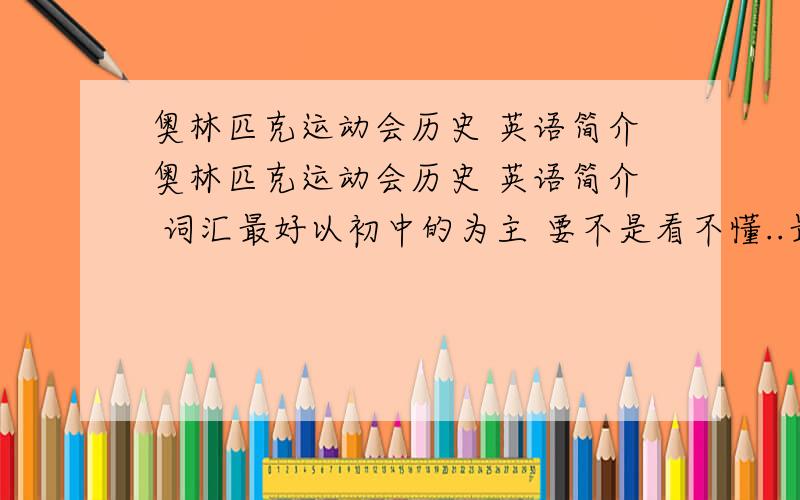奥林匹克运动会历史 英语简介奥林匹克运动会历史 英语简介 词汇最好以初中的为主 要不是看不懂..最好简介一些 但要介绍的全面 麻烦大家不要复制 要有中文注释 最后我会加分 加很多-----
来源:学生作业帮助网 编辑:作业帮 时间:2024/11/16 03:26:59

奥林匹克运动会历史 英语简介奥林匹克运动会历史 英语简介 词汇最好以初中的为主 要不是看不懂..最好简介一些 但要介绍的全面 麻烦大家不要复制 要有中文注释 最后我会加分 加很多-----
奥林匹克运动会历史 英语简介
奥林匹克运动会历史 英语简介 词汇最好以初中的为主 要不是看不懂..
最好简介一些 但要介绍的全面
麻烦大家不要复制 要有中文注释
最后我会加分 加很多--------
奥林匹克运动会历史 英语简介奥林匹克运动会历史 英语简介 词汇最好以初中的为主 要不是看不懂..最好简介一些 但要介绍的全面 麻烦大家不要复制 要有中文注释 最后我会加分 加很多-----
The Olympic Games are a major international event featuring summer and winter sports,in which thousands of athletes participate in a variety of competitions.The Olympic Games have come to be regarded as the world’s foremost sports competition where more than 200 nations participate.The Games are currently held every four years,with Summer and Winter Olympic Games alternating,although they occur every four years within their respective seasonal games.Since 2008,host cities are contracted to manage both the Olympic and the Paralympic Games,where athletes who have a physical disability compete.The Paralympics are held immediately following their respective Olympic Games.Originally,the ancient Olympic Games were held in Olympia,Greece,from the 8th century BC to the 4th century AD.Baron Pierre de Coubertin founded the International Olympic Committee (IOC) in 1894.The IOC has since become the governing body of the Olympic Movement,whose structure and actions are defined by the Olympic Charter.
The evolution of the Olympic Movement during the 20th and 21st centuries has resulted in several changes to the Olympic Games.Some of these adjustments include the creation of the Winter Games for ice and winter sports,the Paralympic Games for athletes with a physical disability,and the Youth Olympic Games for teenage athletes.The IOC has had to adapt to the varying economic,political,and technological realities of the 20th century.As a result,the Olympics shifted away from pure amateurism,as envisioned by Coubertin,to allow participation of professional athletes.The growing importance of the mass media created the issue of corporate sponsorship and commercialization of the Games.World Wars led to the cancellation of the 1916,1940,and 1944 Games.Large boycotts during the Cold War limited participation in the 1980 and 1984 Games.
The Olympic Movement consists of international sports federations (IFs),National Olympic Committees (NOCs),and organizing committees for each specific Olympic Games.As the decision-making body,the IOC is responsible for choosing the host city for each Olympic Games.The host city is responsible for organizing and funding a celebration of the Games consistent with the Olympic Charter.The Olympic program,consisting of the sports to be contested at the Games,is also determined by the IOC.The celebration of the Games encompasses many rituals and symbols,such as the Olympic flag and torch,as well as the opening and closing ceremonies.There are over 13,000 athletes that compete at the Summer and Winter Olympics in 33 different sports and nearly 400 events.The first,second,and third place finishers in each event receive Olympic medals; gold,silver,and bronze,respectively.
The Games have grown in scale to the point that nearly every nation is represented.Such growth has created numerous challenges,including boycotts,doping,bribery of officials,and terrorism.Every two years,the Olympics and its media exposure provide unknown athletes with the chance to attain national,and in particular cases,international fame.The Games also constitute a major opportunity for the host city and country to showcase themselves to the world.